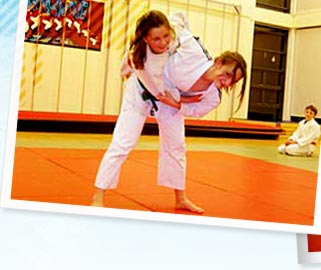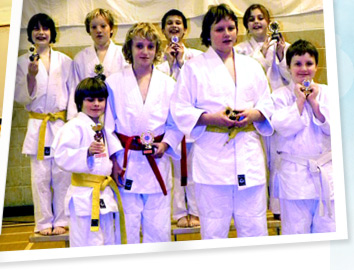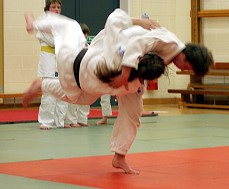


The Rules of Judo ...
 The object in a judo match is to throw the opponent to the ground on his back, to pin him to the ground on his back, or to force him to submit using a choke or an armlock. Any of these score ippon, immediately winning the match. When throwing, anything besides landing the opponent full on his back, such as landing on the hip or shoulder, will score waza-ari or yuko. A waza-ari is a ‘near-fall’, two of which will earn the match. Yuko is a score of lesser value that is not cummulative, rather they are used as deciders if the match ends before either of the higher scores is achieved. In the event that the match is a draw, the clock is reset to match-time and the contest is resolved by the Golden Score rule. This is a sudden death situation where the first contestant to achieve any score wins. If there is no score during this period then the decision is by a majority opinion of the referee and the two corner judges.
The object in a judo match is to throw the opponent to the ground on his back, to pin him to the ground on his back, or to force him to submit using a choke or an armlock. Any of these score ippon, immediately winning the match. When throwing, anything besides landing the opponent full on his back, such as landing on the hip or shoulder, will score waza-ari or yuko. A waza-ari is a ‘near-fall’, two of which will earn the match. Yuko is a score of lesser value that is not cummulative, rather they are used as deciders if the match ends before either of the higher scores is achieved. In the event that the match is a draw, the clock is reset to match-time and the contest is resolved by the Golden Score rule. This is a sudden death situation where the first contestant to achieve any score wins. If there is no score during this period then the decision is by a majority opinion of the referee and the two corner judges.
After a non-ippon throw combat may continue on the ground. Pinning an opponent (holding both shoulders to the mat) for 25 seconds results in ippon. Holding the pin for 20 seconds scores a waza-ari: if waza-ari was previously scored this constitutes ippon.
When armlocks and strangle-holds are used an opponent may submit by tapping out and this is an automatic ippon. Penalties may be given for being inactive during the match or using illegal techniques and fighting must be stopped if a participant is outside the designated area on the mat (tatami).










